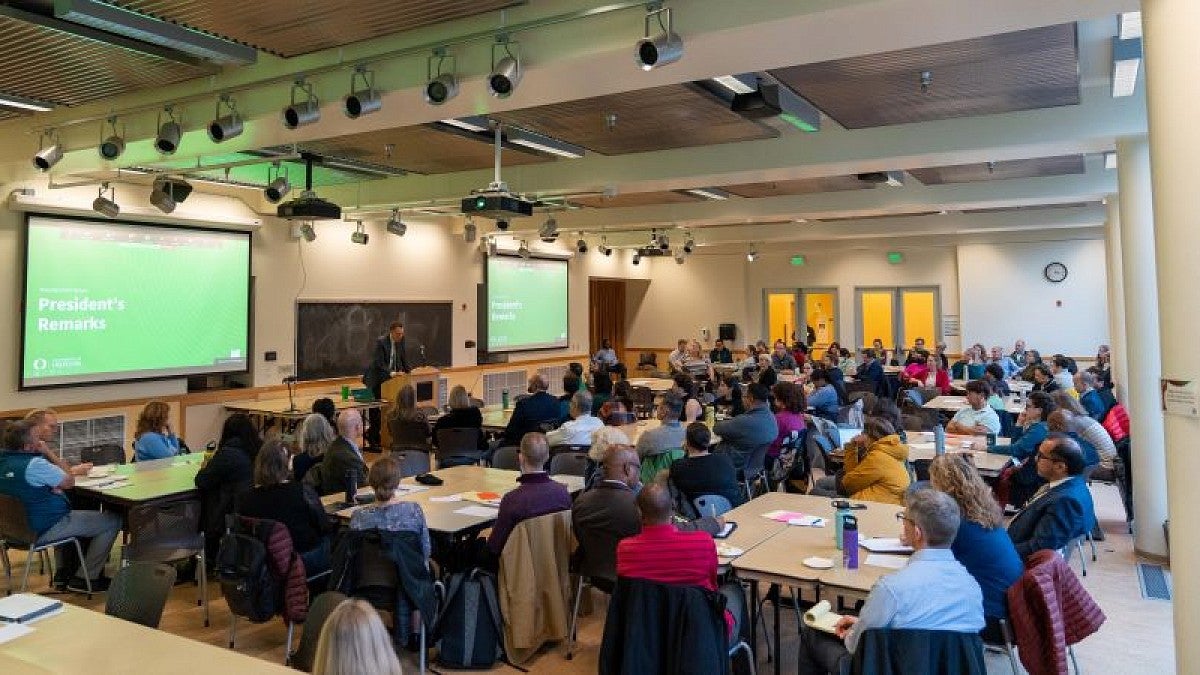More than 300 university employees recently came together for a forum on belonging, climate and culture as part of an effort to continue to build a positive community culture and strengthen connections at the University of Oregon.
The 90-minute hybrid gathering was held Nov. 16 in the Living Learning Center Performance Hall, with a concurrent session in Portland, and others taking part via Zoom.
“We are here to discuss UO climate, culture and belonging at a time when many people at UO and across the world are questioning where, how, in what way and to what place they belong,” Vice President for Equity and Inclusion Yvette Alex-Assensoh said to help open the event.
She also quoted from and drew an analogy to the poem “Fire” by Judy Brown, which notes that a fire needs not only logs to burn, but space between the logs.
“This forum aspires to be a space in between, an opportunity to get away from the daily work and lean into a life-giving, restorative space to engage and build community,” Alex-Assensoh said.
President Karl Scholz followed, adding that improving equity, diversity, inclusion and belonging is not only the right thing to do, it is also in the best interest of the institution, its community members and its future.
“This work is deeply important to me,” Scholz said. “We will not be fully successful if we do not get engagement and support from everyone at the UO. We will not create life-changing experiences for our students, push the boundaries of knowledge and enhance understanding of what it means to be human without drawing on the talent and goodwill of all who are here. “
Following the opening remarks from Scholz and Alex-Assensoh, attendees convened in groups in Eugene and Portland, and in Zoom breakout rooms for a 30-minute discussion on culture and climate in their workplaces.
The groups each submitted a question or idea for Scholz on topics including how to reduce hierarchy, improve onboarding and training, and increase diversity in leadership.
Scholz read aloud and discussed about a dozen questions and ideas collected from participants, giving updates or sharing his thoughts and goals for the university on the topics.
“We can collectively do this: roll up our sleeves and improve our culture,” Scholz said, later acknowledging his deep appreciation for the significant amount of work that staff, faculty and graduate student employees have already invested in the effort to date.
The forum is part of the process that began with the IDEAL climate survey of UO employees held in 2022. Based on the results of the survey, administrators appointed last fall four work groups to make recommendations for university-wide action and charged leaders across campus to share results and create opportunities to make positive change in their units.
In October, Scholz approved a series of recommendations by the four work groups. They included enhancing the university’s complaint-reporting process; supporting employee and supervisor development; embracing a culture of regular feedback; addressing inequity in faculty service; and incentivizing and supporting innovative and sustainable equity and belonging work.
“We have momentum, and I want us to keep this momentum,” Scholz said. “I hope today provides additional insights, which we will use to inform how we implement the recommendations I have approved and continue our work at the school, college and unit levels.”
Information about the results, action planning, and the forum are available on the Office of the President website.


